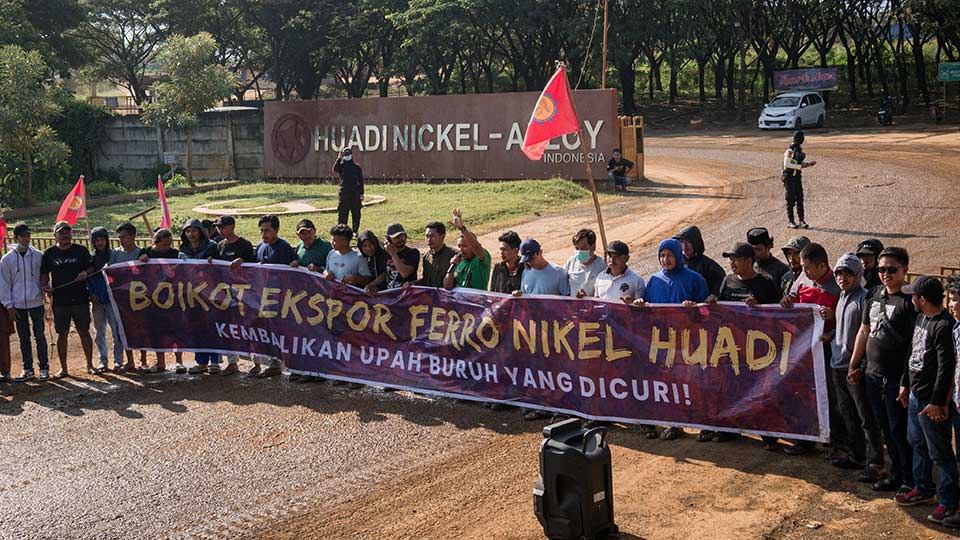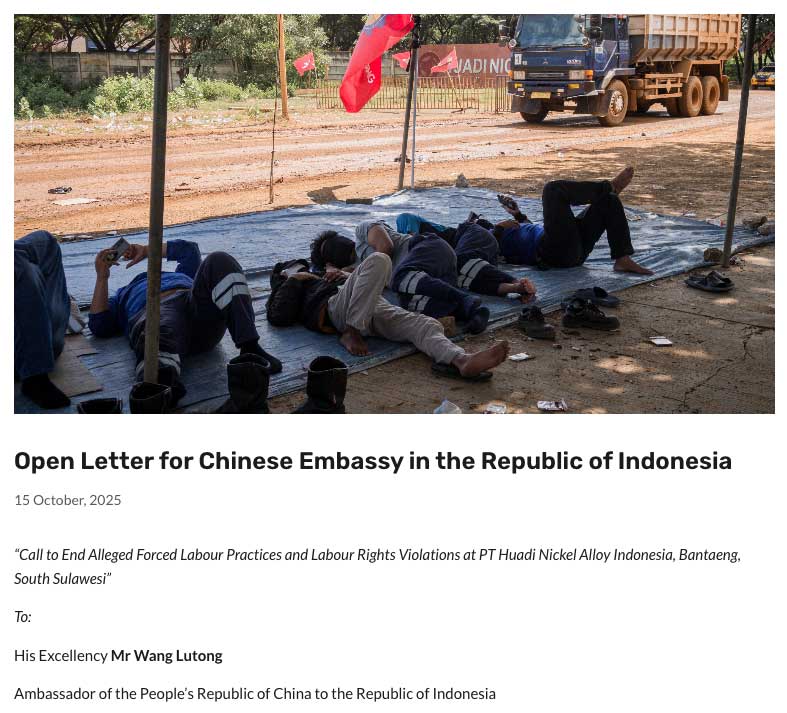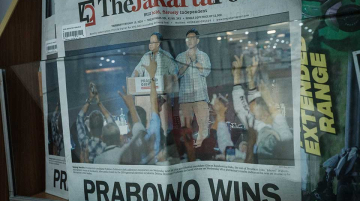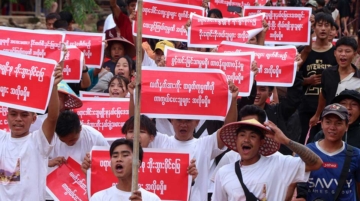
Last month, LBH Makassar, a legal-aid organization in eastern Indonesia that represents workers and low-income communities, delivered an open letter to the Chinese Embassy in Jakarta. The letter describes serious labor violations at PT Huadi Nickel Alloy Indonesia, a Chinese-invested nickel smelter operating in Bantaeng, a coastal district in South Sulawesi, east of Indonesia. It asks the embassy to acknowledge the situation and remind Chinese investors of their stated commitments to responsible overseas conduct.

As of late November, the embassy has not responded.
But whatever the embassy chooses to say, one fact is clear: the responsibility to address these violations belongs to Indonesia, not China. The labor issues alleged in the letter fall entirely under Indonesian law, and only Indonesian authorities have the legal power to enforce it.
The details LBH Makassar documented are serious.
PT Huadi Nickel Alloy Indonesia, part of the China-based Huadi Steel Group, has been operating in Indonesia’s rapidly expanding nickel-processing sector since 2018. According to workers’ testimony gathered by LBH Makassar, many are required to work 12-hour shifts, from around 7:30 a.m. to 8:00 p.m., with roughly 80 hours of overtime every month. That pushes their monthly total to about 240 hours—well above Indonesia’s legal limit. In court filings, the company itself acknowledged a system that in one documented month reached 372 hours, more than twice what Indonesian labor law permits.
Wages also appear to violate the minimum standard. Many workers report earning the equivalent of about $233 per month, even though the 2025 legal minimum wage in South Sulawesi is about $244. Indonesian law requires employers to meet or exceed the minimum wage, and failing to do so is a violation.
Some of the abuses reported go beyond hours and wages.
The smelter reportedly continues operations during Friday Prayers, preventing its mostly Muslim workforce from attending the weekly religious service, which is a protected right under Indonesian law. In the furnace division, LBH Makassar gathered accounts of workers being ordered to clean inside furnace chambers while they were still dangerously hot—hot enough to melt the soles of their shoes.
These are not merely allegations raised by an advocacy group. Indonesia’s own Labor Inspectorate, a government agency responsible for ensuring compliance with labor law, issued a formal ruling in May confirming that overtime had been underpaid for 20 workers. Rather than complying with the order, the company contested it in Indonesia’s Industrial Relations Court in Makassar.
Nothing in this situation requires intervention from a foreign embassy. It requires enforcement by Indonesian institutions: the Labor Inspectorate, local and provincial authorities, the Ministry of Manpower, the national courts, and, when human-rights issues arise, Indonesia’s own National Commission on Human Rights, to which LBH Makassar has also submitted the case.
The idea that a foreign embassy could compel a private company in Indonesia to respect Indonesian law misunderstands how international systems work.
Embassies do not regulate businesses abroad. They have no legal authority over workplace conditions in a host country. And while the Chinese government publicly states that its companies overseas must obey local laws, reminders from any foreign government are meaningless unless the host government enforces those laws.
This case is not fundamentally about China. If the company were French, American, Indian, or Singaporean, the legal obligations would be exactly the same. Foreign investors operate in accordance with the enforcement environment they encounter in the host country. When enforcement is weak or inconsistent, violations by investors of any nationality become more likely.
The story unfolding in Bantaeng, therefore, points to a domestic challenge.
Indonesia has clear laws on working hours, overtime pay, religious rights, and workplace safety. But laws matter only when they are applied. When a company can ignore an inspectorate’s ruling, deny legal wages, exceed maximum hours, and continue operations without consequence, the problem is not the nationality of the investors. The problem is the strength of Indonesian governance.
Indonesia is positioning itself as a crucial link in the global supply chain for electric vehicles, largely because of its vast nickel reserves. But global leadership requires domestic credibility. Protecting workers is not optional; it is the foundation of a functioning industrial sector.
A letter was sent to the Chinese Embassy. But the authority to correct these violations lies entirely with Indonesia. And Indonesia must use that authority if it wants its laws to mean what they say.
This article was co-authored by Yeta Purnama, a researcher at the Center of Economic and Law Studies (CELIOS), and Muhammad Zulfikar Rakhmat, Director of the China-Indonesia Desk at CELIOS.





